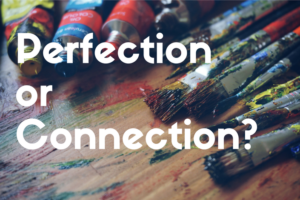George Costanza from Seinfeld is one of my favorite love/hate TV characters. What you might not realize is that many aspects of his character is based on the show’s creator, Larry David. Larry identified so much with self-doubt and classic aspects of perfectionism that he was able to showcase the malady very well in the character of George. In a behind the scenes interview, Larry talks candidly about the fact that he was not happy that the hit show got picked up because he was terrified at the prospect of writing another handful of episodes even though the first had been a huge success. Rather than being encouraged by his success, he was panic stricken because of it. Thoughts flew through his head like, “What if I never do anything better than what I’ve done? What if I maxed out on my talent and he’d never perform as well ever again?” Perfectionism got in his head and caused him to think completely irrationally. Thankfully, he laughed off his fears and allowed these fears to give him fodder for comedy rather than letting those fears get the best of him.
At the root of perfectionism is the belief that I’ll never be enough. It’s this insidious belief that even if I do something great, sooner or later I’m going to mess up and everyone will see that I’m really a fraud, that I don’t belong here and that I don’t deserve a place at the table.
Moses displayed it towards God when he said (loosely paraphrased), “I can’t even talk. You must have the wrong guy to be the spokesperson for Israel, God.” Abraham and Sarah had it when they laughed at God’s proposition of having a son in their old age. Mary had it when she became “greatly terrified” after an angel had told her “you are highly favored among women.” Such reactions may seem irrational and silly, but very very real.
There is something about weakness and so called “imperfection” that is very beautiful to God. Otherwise, he would have never chosen the people he put into Jesus’ family tree (a prostitute, an adulterer, an unwed mother, several people who were at one time out of the chosen tribe of Israel).
One common lie of perfection is that only perfection will lead us to success and excellence. We think that if we try really hard to be perfect, we just might get there. There is a subtle but important difference between the pursuit of excellence and perfection. Perfection is about performance. Excellence is about connection.
When I go to the theater to see something that will really stir me, like the movie Les Miserables, I don’t want to see a perfect performance, I want to see one that connects with me. I can watch Anne Hathaway perform her passionately imperfect performance with sweat beading and spit flying or I can watch a perfectly polished version that is void of connection. Which one would you prefer? There is a reason I cannot give you the name of the perfect performance, whoever gave that performance is not remembered.
You could make the argument that it is possible to produce a flawless product, whether it is in the way you present yourself or in the work you do. But maybe a better question to ask is not how perfect your work is, or how flaw free it it, but how much of an impact it makes?
I once saw a beauty article about a certain actress. It made the case for her beauty by listing how beautiful she was based on itemized aspects of her appearance. Her hair was perfect, her skin was perfect, her proportions were perfect. The question it left me was this: do we now define beauty based on chopping ourselves into segments and examining the perfection of each segment? Is that what we’ve reduced beauty to in our “advanced” world? In this age of air-brushed images and edited productions, maybe we’ve lost sight of what it is that is beautiful and what it is that human nature is really longing for, which is connection over perfection. Maybe the Mona Lisa is beautiful not because of hair and proportion and lighting, but because the whole of the composition and how she connects with onlookers.
If we change our focus from perfection to connection, then everything I’m doing, from how I dress to how I execute my work speaks of something. It either will promote that connection, or it will shut it down. When we pursue excellence, our entire goal is to get our hands dirty, and take big risks in order to connect big. And when we learn and grow to attain higher and higher levels of excellence (getting better at our craft, etc.) it is only so we will remove all the roadblocks to more and more connection— connection between us and God, connection between ourselves and others who walk this planet with us. The point is not to say to God or to anyone else, “Look how mistake free I am.” The point is to say to God and the world around, “Connect with me. Connect with the message I’m bringing.”
How does this connect with you? What ways have you found helpful in getting you out of the rut of perfectionism?

